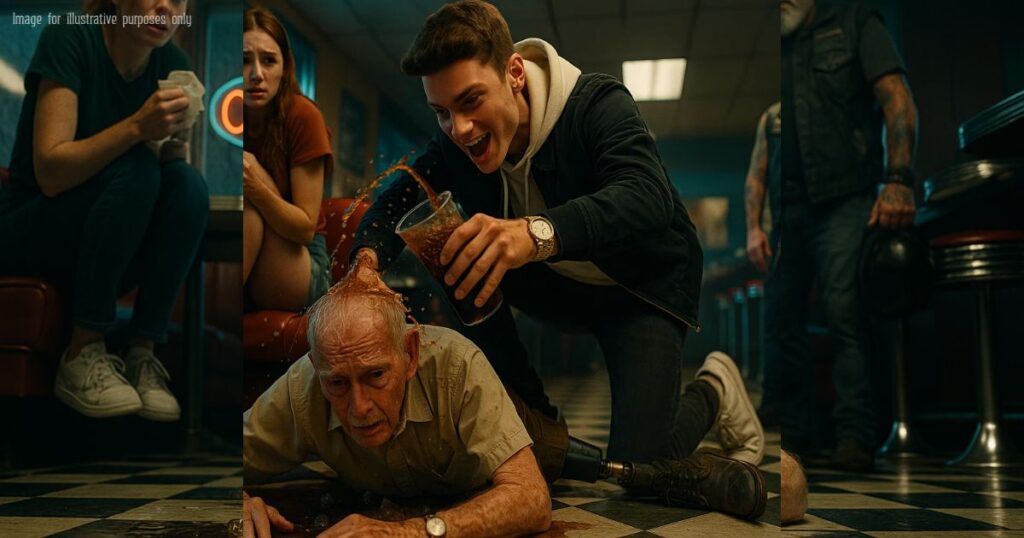“Doc is a medic,” I said. “Boys like me came home because men like him didn’t ask for thanks before they tied a belt around a bleeding limb. You dumped sugar water on a lifeline.”
He stood there, hands at his sides, shoulders shaking in a way only I could see.
He nodded.
Then he nodded again.
If you’ve ever seen a boy start to become a man, you know the sound of that silence.
On the fifth morning he showed up before open, hair damp with dew, eyes red.
No cameras.
No audience.
He wheeled Doc’s chair from the curb, knees knocking on the footrest because he didn’t know how to steer yet.
He learned. He brought the old man to his usual seat, set down coffee, and said the words I had been waiting to hear.
“I’m sorry I was loud when I should’ve listened.”
Doc’s eyes filled, then steadied. “You’re listening now,” he said.
Ruth pretended to polish a sugar dispenser because sometimes you have to give a moment a door to walk through.
That Saturday I called a few friends.
We ride quiet when the occasion calls for it.
No engines revving for attention, just a low idle that feels like a heartbeat coming through steel. We lined the street from the corner to the diner door, chrome catching the late sun, patches from units that don’t forget.
No speeches.
No signs.
The town stepped out of shops with their aprons still on.
The high school kids stood shoulder to shoulder without knowing what to do with their hands. They put them over their hearts because sometimes your body knows first.
I walked inside and held the door.
Doc rolled through the corridor of bikes, eyes bright as LEDs on a clear night.
Mason walked beside him, not in front, hands light on the handles.
Lena matched their pace, a napkin clutched like a flag. When they reached the booth, a small card waited on the table, hand-lettered by Ruth: Reserved for Our Veterans.
There are words that don’t belong to anyone.
Thank you is one of them.
They filled the room anyway.
Mason’s father arrived halfway through the pie.
He had the tight jaw of a man who’s ready to fix something with power he can measure.
Then he saw his kid refill Doc’s coffee without waiting for permission and he stopped. He put his wallet away without taking it out.
When a grown man learns, the room changes. So does a street. So does a town.
A week later, Veterans Day rolled in on a sky so blue it looked newly painted.
The parade wasn’t big, but it was ours.
A fire truck led, lights gentle instead of loud.
Behind it, antique cars, then Scout troops tossing candy to younger kids whose pockets were already full. My friends and I rode sweep, two by two, engines soft.
On the sidewalk, in chairs Ruth had carried out at dawn, sat a row of elders whose stories fill the quiet when we care to listen.
Doc sat in the middle.
Mason had learned the art of the push by then.
He didn’t grip the chair like it might run away; he guided it the way you learn to handle a clutch. Lena walked on Doc’s free side. They made an odd little trio that looked exactly right.
When I passed them, I didn’t salute like a headline.
I tapped two fingers to my brow. Doc answered the same way. It was enough.
People didn’t raise phones that day.
They raised hands.
The sound wasn’t a cheer. It was a human hush, the soft roar of respect.
After the parade, Mason came to my shop.
He didn’t ask to intern or to make amends with tasks that can be checked off.
He asked me to show him how to change the oil on a bike that wasn’t his.
We stained our hands and talked about torque and patience and why most leaks aren’t the engine’s fault. Sometimes you need to stand still and see where the drip starts.
What happened in the diner could have turned into a spectacle.
It could have become a badge for my ego, or a punishment Mason wore like a stone. Instead it became something quieter and heavier. A habit.
I still drink coffee at that diner. Doc still faces the door. Mason holds doors for people who don’t need him to, which is when holding a door means the most. His father waves at me at red lights now. He is learning a new kind of profit.
The thing about strength is that it isn’t loud.
It doesn’t need to prove itself with a slap or a shout.
It holds a towel. It picks up ice from the corners. It kneels before it asks someone else to kneel. It teaches without demanding a stage.
If you’re strong enough to knock someone down, you’re strong enough to help them up.
If you’re lucky, you learn that early.
If you’re luckier, you learn it when someone decides to show you instead of telling you. That day in the diner, I wanted to throw a punch. I opened my hand.
Respect costs your pride. It pays back with your soul.
Thank you so much for reading this story!
I’d really love to hear your comments and thoughts about this story — your feedback is truly valuable and helps us a lot.
Please leave a comment and share this Facebook post to support the author. Every reaction and review makes a big difference!
This story is a work of fiction created for entertainment and inspirational purposes. While it may draw on real-world themes, all characters, names, and events are imagined. Any resemblance to actual people or situations is purely coincidenta


